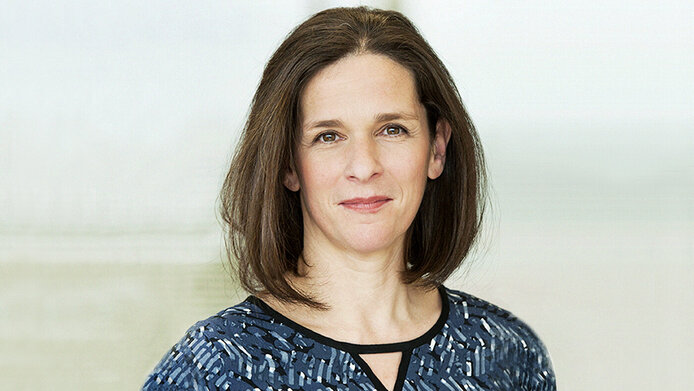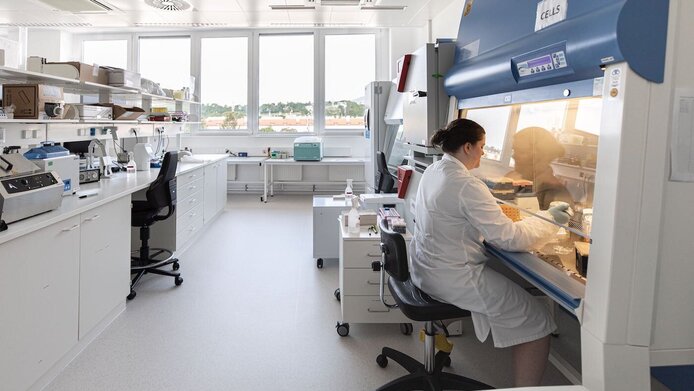Measles viruses as a Trojan horse against Corona

FWF: You are researching a new vaccine and seem to know exactly what needs to be done.
Katrin Ramsauer: It is true that we are in a position to react relatively swiftly to this new situation. Themis was established ten years ago, and we have repeatedly developed vaccines against infectious diseases such as Zika or Lassa fever. The technology we use can now be adapted for the coronavirus. It’s an advantage that this is not a completely new type of virus. Coronaviruses have been around for a long time, and they play an important role in veterinary medicine. There are cat coronaviruses which we have known for years. For this reason, this type of virus has actually been relatively well studied. We do understand quite well which components of coronaviruses cause an immune response. As with any virus, the responsible components are mainly surface proteins that are recognized by the immune system. Coronaviruses carry a specific molecule on their surface that is already known from research on the SARS and MERS coronaviruses. We have been running a project on MERS for two years, so we know roughly which way to go.
FWF: Measles viruses play a role in your work – in what way?
Ramsauer: The technique we use is based on the measles vaccine, which is a live vaccine involving attenuated measles virus. Around 20 years ago, researchers developed a technology to modify these measles viruses so that they additionally produce certain foreign proteins. We insert foreign genes into the measles vaccine; you can think of it as a Trojan horse. We inoculate the measles vaccine with additional functions; they are hidden inside and show the immune system what a coronavirus looks like.
FWF: How is this research organized?
Ramsauer: The funding programme is run by CEPI, which stands for the Coalition for Innovation for Epidemic Prevention. CEPI is a very exciting organisation that was founded in 2016 in the wake of the Ebola crisis. The big problem back then was that the existing vaccine candidates were never developed further once the disease had been contained. The reason being, in a nutshell, that pharmaceutical companies simply don't make any money from it. CEPI was founded to prevent exactly that from happening. The funds come from the Wellcome Trust and the G20 countries, and the governments of Norway, Germany and Japan have also contributed large amounts. At that time, an evaluation was undertaken to identify which of the already known virus diseases might trigger pandemics. After experts were consulted CEPI focused on three viruses, one of them being the MERS coronavirus.
This was a very good idea, for now there are already several projects on the topic that are very well funded, and we also have the first clinical data on coronavirus vaccines. While the MERS vaccine itself cannot be used – the new virus is too different – we have still learned a great deal about the test methods. CEPI is also funding the current corona project, and since we already had a contract with them, we received new funding very easily and quickly. We are now in a consortium with the Institut Pasteur in Paris and the University of Pittsburgh. Our partners are helping us to produce the vaccine and carry out the first animal tests. We are focusing on producing it on a large scale and conducting the first clinical tests.
FWF: How long do you think will it take for a vaccine to be available for general use?
Ramsauer: Everyone is talking about one or two years, which I think is realistic. The big difference to conventional vaccine development is that we are now undertaking several steps simultaneously. Under normal circumstances, you first try to do a safety study and answer a number of questions: is the vaccine safe for humans? Do we get an immune response? If the data look good, you do a larger study and examine how you can produce it on a large scale. What happens right now is that we start a phase-one study and start producing this on a large scale at the same time. We are not the only company to be doing that at the moment. There is a certain risk, of course, that it may not work for some reason or other, but we don't expect that to happen. It is a realistic scenario that it will be possible to produce millions of units next year and start vaccinating people.
Katrin Ramsauer is head of the research and development department at Themis, a Viennese biotech company which specializes in taking academic research projects on vaccines to industrial implementation. Ramsauer is responsible for the planning and execution of clinical trials. In 2006, she was awarded a Hertha Firnberg Fellowship from the Austrian Science Fund FWF, which enabled her to move into virology.
Global Alliances
CEPI (Coalition for Epidemic Preparedness Innovations) is a global partnership between public and private organizations. It was founded in 2017 by the governments of Norway and India together with the Belinda and Bill Gates Foundation, the Wellcome Trust and the World Economic Forum. To date, CEPI has raised a total of 760 million dollars. Apart from the founding members, donors are the United Kingdom, Germany, Canada, Australia, Ethiopia, Belgium, Denmark and Finland. The European Commission is also involved with its funding programmes. The general thrust of CEPI’s activities is determined in consultation with an independent scientific advisory committee. CEPI aims to speed up the development of vaccines against infectious diseases and to ensure access to these vaccines in the event of a crisis.
Further reading
New York Times: Covid-19 Changed How the World Does Science, Together






